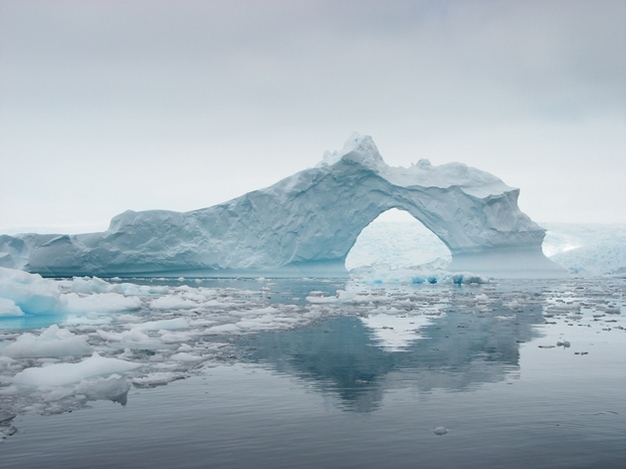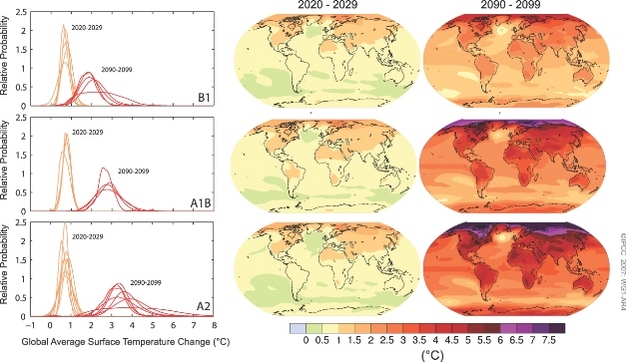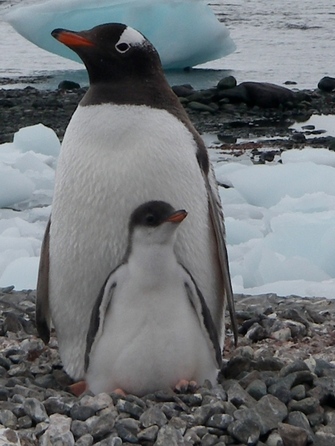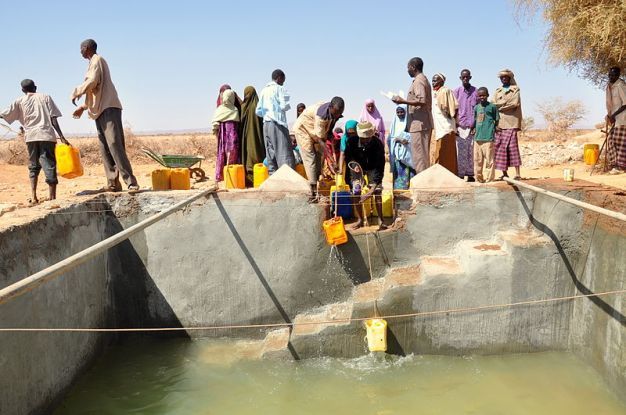« Prev Next »

Climate change is one of the most challenging issues facing the world today. Here we illustrate how ethical analysis can help us to understand both the nature of the climate problem and constraints on possible solutions (Vanderheiden 2008, Gardiner et al. 2010, Arnold 2011). In doing so, we will focus on how climate change threatens fundamental values, and how action to address it raises serious concerns of fairness and responsibility.
Climate Change as a Challenge to Ethical Action
Climate change has been described as a "perfect moral storm" because it brings together three major challenges to ethical action in a mutually reinforcing way (Gardiner 2011a). The first challenge stems from the fact that climate change is a truly global phenomenon. Once emitted, greenhouse gas emissions can have climate effects anywhere on the planet, regardless of their source (IPCC 2007). This is often said to result in a prisoner's dilemma or tragedy of the commons structure played out between nation states: although collectively all countries would prefer to limit global emissions so as to reduce the risk of severe or catastrophic impacts, when acting individually, each still prefers to continue emitting unimpeded (e.g., Soroos 1997, Helm 2008, but see Gardiner 2011a). At the same time, there are skewed vulnerabilities: at least in the short- to medium-term, many of the most vulnerable countries and people are those who have emitted the least historically, and whose emissions levels continue to be relatively low. This appears to be seriously unfair and casts a notable shadow over both practical and theoretical efforts to secure global cooperation.

The second challenge is that current emissions have profoundly intergenerational effects. Emissions of the most prominent greenhouse gas, carbon dioxide, typically persist in the atmosphere for a long time, contributing to negative climate impacts for centuries, or even millennia (IPCC 2007). This too seems unfair, especially if future negative impacts are severe and cumulative. In addition, the temporal diffusion of climate change gives rise to an ethical collective action problem that is even more challenging than the traditional tragedy of the commons both in its shape and because normal kinds of cooperation do not seem to be possible across generations.
The third challenge to ethical action is that our theoretical tools are underdeveloped in many of the relevant areas, such as international justice, intergenerational ethics, scientific uncertainty, and the appropriate relationship between humans and the rest of nature (e.g., Jamieson 1992). For example, climate change raises questions about the (moral) value of nonhuman nature, such as whether we have obligations to protect nonhuman animals, unique places, or nature as a whole, and what form such obligations take if we do (see, e.g., Jamieson 2003, Palmer 2011). In addition, the presence of scientific uncertainty and the potential for catastrophic outcomes put internal pressure on the standard economic approach to environmental problems (e.g., Sagoff 2007, Stern 2007, Gardiner 2011a), and play a role in arguments for a precautionary approach in environmental law and policy that some see as an alternative (see, e.g., Sunstein 2005, Whiteside 2006).

The global and intergenerational dimensions of the perfect moral storm provide serious temptations for those in the current generation who contribute heavily to climate change to pass most of the burden of their activities on to people in other parts of the world and the future in unfair ways. In particular, the complexity of the ethical and scientific terrain may make us susceptible to arguments for inaction (or inappropriate action) that shroud themselves in moral language but which are actually weak and self-deceptive. Unfortunately, there is some evidence for this in the ongoing political inertia in developing a robust global regime. This suggests the need for work in moral and political philosophy that exposes inadequate rationales and articulates compelling reasons as to how and why we should address climate change. Such work can help preserve and extend the limited progress currently being made and reinforce arguments against those who have failed to deliver on their promises to reduce emissions and contribute to adaptation funds (e.g., Brown 2002).

Addressing Climate Change
Trajectory of Future Emissions
First, from the perspective of future generations and some vulnerable species it would probably be better if emissions were substantially reduced quickly, so as to minimize future climate damages. However, this may be costly for the current generation while having only minimal benefits for them, which may seem unfair.
Second, poorer people and nations who have not emitted very much thus far may believe it unfair to demand that they minimize their emissions for the sake of future generations, especially if future people are likely to be better off, and if many present high emitters are already much richer than the future poor are likely to be (e.g., Posner & Weisbach 2010, Harris 2010).
Third, climate change threatens nonhuman animals and nature in potentially devastating ways. For example, we may have an immediate obligation to protect coral reefs to preserve biodiversity, fragile and unique ecosystems and the sentient beings living in such reefs. However, over the long term, climate change will also bring new species into existence and change ecosystems around the world. It is unclear how we should understand our responsibilities in light of such changes (e.g., Palmer 2011).
The future trajectory concern is currently theoretically underexplored. Public debate tends to focus on quantitative targets, such as 2˚C or 350ppm. However, specific quantitative targets require further ethical defense in light of issues such as those raised above, and so are likely to come under increasing philosophical pressure if and when the world moves towards serious action. 2) Allocating emissions at a particular timeSignificantly more philosophical attention has been devoted to the question of how to allocate fairly whatever total global emissions are allowable at a particular time under an appropriate long-term trajectory. As it turns out, most writers agree that developed countries should shoulder most of the burden (at least initially), such that they should be permitted fewer emissions than developing countries (e.g., Shue 1999, Singer 2002). This consensus rests on a number of distinct but overlapping justifications. Historical accounts of justice support it because developed countries are causally responsible for most of the cumulative emissions that are currently contributing to climate change. Views that emphasize moral equality support it because developed countries continue to emit much more per capita than developing countries. Those that prioritize aiding the least well-off endorse the consensus because developed countries are much richer on average, and so more able to bear the burden of reducing emissions. Finally, utilitarian views support it because it seems that better outcomes will be achieved if the global poor are able to meet their subsistence needs and to move out of poverty through a larger share of allowable emissions, than if the "luxury emissions" of wealthier countries are protected. It has even been argued that there are good utilitarian reasons for supporting the other approaches to justice in this case, as secondary rules that promote utility (Singer 2002).
The primary objections made to the consensus view concern fairness. For example, some argue that countries are not responsible for emissions prior to 1990 (at least) because of ignorance about the climatic effects of these emissions, and others claim that it would be unfair to hold the present inhabitants of developed countries responsible for past emissions given that many of those responsible are now dead (see, e.g., Caney 2005, Posner & Weisbach 2010). However, these arguments remain controversial (e.g., Shue 1999, Gardiner 2011a). For example, it is argued that since the present inhabitants of developed nations have benefited in many ways from the emissions of past inhabitants (e.g., from infrastructure and an established way of life), it is not unfair to hold them (rather than the victims) accountable for at least some historic emissions.
Unavoided Impacts
Much of the ethical consensus in favor of the idea that developed countries should bear the greatest burden for addressing climate change seems to carry through to unavoided impacts. At the same time, it has been argued that a distinct conceptual approach should be taken because this issue is much more backward looking than issues surrounding emissions (e.g., Jagers & Duus-Otterström 2008, Vanderheiden 2008). Much more work needs to be done to sort out the relevant conceptual issues, as well as what policy should look like in practice. For example, vulnerability to climate impacts is sometimes affected by previous wrongs, such as the legacy of colonization, slavery, economic exploitation, and so on. In such cases, unavoided climate impacts may constitute a "compound injustice" (Shue 1992). In addition, it is possible that some impacts (e.g., sea level rise) threaten the very existence of entire communities and cultures (e.g., small island states), raising issues of ethics and justice that go beyond compensation as normally conceived (e.g., to reconciliation) (Gardiner 2011a).
Of course, an entirely different way to address impacts that are already in the pipeline would be to intentionally manipulate (i.e., engage in geoengineering of) the global climate with the aim of minimizing such impacts. For example, it has been suggested that temperature rises might be offset by injecting sulfur into the stratosphere so as to reflect more incoming solar radiation back to space. Such proposals raise a wide range of ethical issues that are just beginning to be taken up in the literature (e.g., Jamieson 1996, Gardiner 2011a, 2011b).
Individual Responsibility
Thus far the discussion has focused on how climate change should be addressed from a collective perspective, but what, if any, responsibilities do individuals have with respect to climate change? At one extreme, some argue that the responsibilities of individuals are primarily political, and that they have little or no obligation to change their consumption or lifestyle choices (Sinnott-Armstrong 2005); at the other, some maintain that individuals ought take responsibility for their personal choices and develop a set of "green virtues" that are not contingent on how others respond (Jamieson 2007). Part of the problem that this debate wrestles with is that one person's emissions seem very small in comparison with the global total, and as such unlikely to harm anyone considered in isolation. However, recently, this assumption has been challenged by an argument that claims that, on average and over the course of a lifetime, the emissions of a single typical American are significant enough to contribute to the severe suffering and/or deaths of two future people (Nolt 2011). The theoretical debate about individual responsibility is in its infancy, but is likely to heat up as more philosophers devote attention to this issue.
Conclusion
Climate change involves serious ethical issues, especially in its global, intergenerational, and ecological dimensions. Despite challenges owing to underdeveloped theories and pragmatic issues, there is an important initial consensus concerning the need for, and the overall shape of, serious action and the relevance of key ethical concerns, such as fairness and responsibility. Climate ethics is an emerging field that has much to offer, but within which much more work remains to be done.References and Recommended Reading
Adger, N. et al. eds. Fairness in Adapting to Climate Change. Cambridge, MA: MIT Press, 2005.
Arnold, D. G. ed. The Ethics of Global Climate Change. Cambridge, UK: Cambridge University Press, 2011.
Brown, D. American Heat: Ethical Problems with the United States' Response to Global Warming. Lanham, MD: Rowman & Littlefield, (2002).
Caney, S. Cosmopolitan justice, responsibility and global climate change. Leiden Journal of International Law 18, 747-775 (2005).
Gardiner, S. M. A Perfect Moral Storm: The Ethical Challenge of Climate Change. Oxford, UK: Oxford University Press, 2011a.
Gardiner, S. M. Some early ethics of geoengineering the climate: A commentary on the values of the Royal Society report. Environmental Values 20, 163-188 (2011b).
Gardiner, S. M. et al. eds. Climate Ethics: Essential Readings. Oxford, UK: Oxford University Press, 2010.
Harris, P. G. World Ethics and Climate Change: From International to Global Justice. Edinburgh, UK: Edinburgh University Press, 2010.
Helm, D. Climate-change policy: Why has so little been achieved? Oxford Review of Economic Policy 24, 211-238 (2008).
IPCC (Intergovernmental Panel on Climate Change). Climate Change 2007: The Physical Science Basis. Cambridge, UK: Cambridge University Press, 2007.
Jagers, S. & Duus-Otterström, G. Dual climate change responsibility: On moral divergences between mitigation and adaptation. Environmental Politics 1, 576-591 (2008).
Jamieson, D. Ethics, public policy and global warming. Science, Technology, & Human Values 17, 139-153 (1992).
Jamieson, D. Ethics and intentional climate change. Climatic Change 33, 323-336 (1996).
Jamieson, D. ed. A Companion to Environmental Philosophy. Malden, MA: Blackwell Publishing, 2003.
Jamieson, D. When utilitarians should be virtue theorists. Utilitas 19, 160-183 (2007).
Nolt, J. How harmful are the average American's greenhouse gas emissions? Ethics, Policy & Environment 14, 3-10 (2011).
Palmer, C. "Does nature matter? The place of the nonhuman in the ethics of climate change," The Ethics of Global Climate Change, ed. D. G. Arnold. Cambridge, UK: Cambridge University Press, 272-291, 2011.
Posner, E. & Weisbach, D. Climate Change Justice. Princeton, NJ: Princeton University Press, 2010.
Sagoff, M. The Economy of the Earth: Philosophy, Law, and the Environment, 2nd ed. Cambridge, UK: Cambridge University Press, 2007.
Shue, H. "The unavoidability of justice," in The International Politics of the Environment, eds. A. Hurrell & B. Kingsbury. Oxford, UK: Oxford University Press, 373-397, 1992.
Shue, H. Global environment and international inequality. International Affairs 75, 531-545 (1999).
Singer, P. One World: The Ethics of Globalization. New Haven, CT: Yale University Press, 2002.
Sinnott-Armstrong, W. "It's not my fault," Perspectives on Climate Change: Science, Economics, Politics, Ethics, eds. W. Sinnott-Armstrong & R. B. Howarth. Amsterdam, Netherlands: Elsevier, 285-307, 2005.
Soroos, M. S. The Endangered Atmosphere: Preserving a Global Commons. Columbia, SC: University of South Carolina Press, 1997.
Stern, N. The Economics of Climate Change: The Stern Review. Cambridge, UK: Cambridge University Press, 2007.
Sunstein, C. R. Laws of Fear: Beyond the Precautionary Principle. Cambridge, UK: Cambridge University Press, 2005.
Whiteside, K. H. Precautionary Politics: Principle and Practice in Confronting Environmental Risk. Cambridge, MA: The MIT Press, 2006.
Vanderheiden, S. Atmospheric Justice: A Political Theory of Climate Change. Oxford, UK: Oxford University Press, 2008.






























